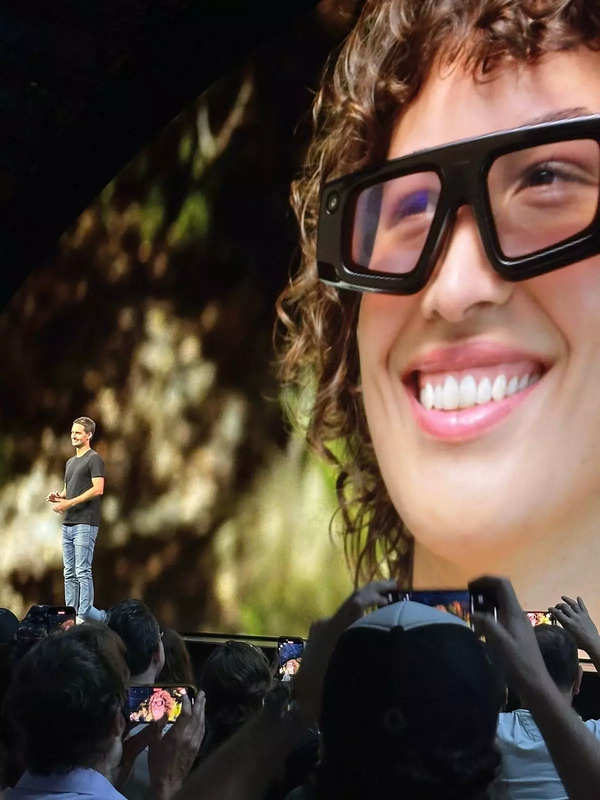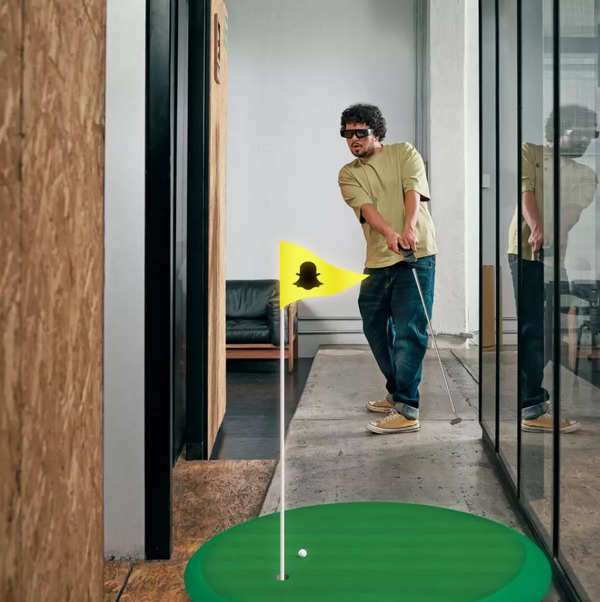The fifth generation Snap spectacles, which the company says weigh 226 gram, sit lightly on the eyes and behave like usual glasses till you power it up and it conjures a screen that lets you have fun or get creative with a range of lenses.
With big tech seeing the virtues of AR glasses, which are different from the opaque and chunkier VR headsets, Snap is first off the blocks in this new class of wearables. Meta is believed to be poised to introduce its own AR glasses too.
The Snap spectacles, which are a standalone device and can be operated by pinch gestures of your right hand and a virtual console that opens on your left palm, work by projecting an overlapping AR image on your view and so don’t cut you off from reality.

For example, if you are sitting in your living room, you can play a game of virtual chess on your real table wearing the spectacles – lifting pieces with pinch gestures and making your moves on the virtual board – while sipping on a (real) cup of coffee. The table, the chess board and pieces and the cup of coffee – you see all three clearly.
Snap described the spectacles as “the result of a decade of research and development to introduce hardware that breaks the bounds of screens and brings people together in the real world”.

The spectacles can also be paired with a phone through Snap’s ‘Spectacles’ app, which lets one use the phone as a game controller and also mirror the phone screen. The ‘spectator mode’ feature allows group activity with the spectacles. For example, two players can play that game of chess if both are wearing the spectacles.
The new AR glasses were launched by Snap co-founder Evan Spiegel at the Santa Monica-based company’s main annual event, Snap Partner Summit, at the Barker Hangar in Los Angeles.
“Tech can be way better than it is today. We can’t be bound by screens forever. We need something more intuitive, more human,” Spiegel said.
Snap also announced a partnership with OpenAI that will open up artificial intelligence models to lens developers using the new AR glasses. As Spiegel put it, “no tech event in 2024 is complete without an OpenAI partnership”. Like image-generating AI tools, its Easy Lens can do the same to instantly generate lenses.
At the summit, the company also announced Lego Games launching ‘Bricktacular’ for the spectacles, a partnership with Niantic, and a Star Wars Galaxy experience being crafted by ILM Immersive, Lucasfilm’s interactive studi0.
The spectacles, the company said, will be available for now only to lens developers, including those from India, working with Snap for a $99 monthly subscription.
Features
The Snap AR glasses are equipped with four cameras that power Snap Spatial Engine and enable hand tracking. The Optical Engine has been designed to enable a see-through AR display.
The glasses work through liquid crystal on silicon (LCoS) micro-projectors that create vivid images and have waveguides that make it possible to see the images created by the LCoS projector without the need for calibrations or custom fittings. They have a 13 millisecond motion-to-photon latency that give, the company said, “incredible accuracy, integrating them naturally into your environment”.

The Optical Engine delivers a 46-degree diagonal field of view with a 37 pixel per degree resolution – similar to a 100-inch display which is 10 feet away. The glasses tint automatically based on surrounding light and work indoor and outdoor.
The dual system-on-a-chip architecture with two Snapdragon processors splits the compute workload on the spectacles while titanium vapour chambers dissipate heat. The company announced a runtime on a single charge of up to 45 minutes.
“We want to be the most developer-friendly platform in the world and empower developers to invest in building amazing lenses,” the company said in a statement, while announcing that the spectacles would have no developer tax and would give developers new ways to build and share lenses. “Instead of a complicated compiling process, the newly rebuilt Lens Studio 5.0 lets developers quickly push their project to spectacles,” it said.
Simplified Snapchat
Snap also announced at the summit it is testing “a new and simplified Snapchat that organises the app around communicating with friends, using the camera, and watching snaps from friends and the broader Snapchat community, including creators and publishers”.
“We’ve been working on unifying Stories and Spotlight for some time. Now, with this new and simplified design, Snapchatters will have a more personal and relevant viewing experience,” it said.

